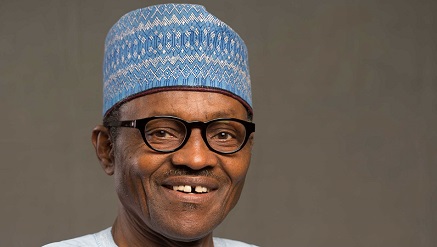General News
Buhari Sacks CSO for “Shady Deals”, Leaking Info to Diezani

President Muhammadu Buhari has fired Abdulrahman Mani, his chief security officer (CSO), over what insiders described as “shady deals” in fixing appointments and for “undermining” the president.
Mani allegedly committed various misdemeanours, “chief among which was a recent discovery that he was actually the one who leaked Buhari’s itinerary to Diezani Alison-Madueke when he travelled to London in May”.
TheCable reported that Alison-Madueke, then minister of petroleum resources, had surprisingly travelled on the same British Airways flight with Buhari, sitting in the same cabin and right behind the then president-elect.
The former minister normally flew private jets in and outside the country and her presence on the flight was not considered a coincidence.
It was alleged that she wanted to curry the favour of Buhari following a series of allegations of corruption against her, although her aides denied the claim, maintaining that she was on a private trip for her son’s graduation.
“Investigations also revealed that Mani has been actively undermining the president, working against every value the president upholds and conducting himself in such a manner as to suggest that he is out to pull down the president,” the source told TheCable.
Mani was appointed Buhari’s CSO after the presidential election in March, although he had been organising security for Buhari before then. Buhari also fired Widi Liman, his administrative officer, who was said to be hand-in-gloves with Mani in turning securing appointments with the president into a “business venture”.
Bashir Abubakar is the new CSO to the president while Mani has been redeployed to Ebonyi state. Abubakar was until now an assistant director in the Bayelsa state command of the Department of State Service (DSS).
Liman, who is yet to be replaced, was a close aide to governor of Kaduna state, Nasir el-Rufai, while he was FCT minister.
He has been transferred to Oyo state command of the DSS. CSO vs ADC: Battle for supremacy Prior to his sack, Mani had been engaged in a battle of supremacy with the ADC to the president, Mohammed Abubakar, a lieutenant colonel. Apparently acting on the orders of Buhari, Abubakar had issued a memo barring DSS personnel from locations inside the presidential villa, stating that the armed forces and the police, trained as presidential body guards (PBGs), were to “provide close/immediate protection for Mr. President henceforth”.
He warned that DSS personnel should stay away from specific areas in the premises including “Admin Reception, Service Chiefs Gate, Residence Reception, Rear Resident, Resident Gate, Office Reception, C-In-C Control Office, ACADE Gate, C-IN-C Control Gate and Panama”.
Abubakar said DSS personnel would man other duty beats and locations located within the immediate outer perimeter of the presidential villa “alongside other security forces”.
Mani, perhaps unaware that Abubakar was carrying out the president’s instructions, issued a counter circular directing the DSS personnel to disregard the order and saying that the relevant statutes give DSS the responsibility of close protection for the president.
He argued: “Though further actions have been initiated in this regard, including routine redeployment of close body guards out of the villa, and deployment of new ones, it is important to state that the duties hitherto performed by the personnel of the DSS (SSS) in the Presidential Villa and/or any other Key Vulnerable Points (KVPs) are backed by relevant Statutes and Gazetted Instruments of the Federal Republic of Nigeria. “Among others, these roles include close body protection of the President in line with standard operational procedures and international best practices.
“For the avoidance of doubt, Section 2 (1) (ii) of Instrument No. SSS 1 of 23rd May, 1999, made pursuant to Section 6 of the National Security Agencies (NSA) decree of 1986 which has been re-enacted as Section 6 of NSA Act CAP N74 LFN 2004, empowers personnel of the DSS to provide protective security for designated principal government functionaries including, but not limited to the President and Vice President as well as members of their immediate families.
“It also mandates the DSS to provide protective security for sensitive installations such as the Presidential Villa and visiting foreign dignitaries.
For this reason, personnel of the DSS who are on this schedule are carefully selected and properly trained both locally and abroad. Furthermore, continued background checks are maintained on them to confirm suitability and loyalty.
“In fact, the issues raised in the aforementioned circular tend to suggest that the author may have ventured into a not-too-familiar terrain.
The extant practice, the world over, is that VIP protection, which is a specialised field, is usually handled by the Secret Service, under whatever nomenclature.
They usually constitute the inner core security ring around every principal. The police and the military by training and mandate, are often required to provide secondary and tertiary cordons around venues and routes.
“However, all over other security agencies including the army, the police and others have their roles to play. It is on this note that heads of all security agencies currently in the Presidential Villa and their subordinates are enjoined to key into the existing command and control structure.
They are to work in harmony with each other in full and strict compliance with the demands of their statutory prescribed responsibilities.” Buhari had become uncomfortable with the DSS for their perceived partisanship before the general election.
Ita Ekpeyong resigned as the DG of DSS on Thursday amid reports that he was forced out, while Lawan Daura was appointed to replace him in an acting capacity.
General News
EFCC to Use Space Technology to Boost Asset Tracking, Investigations

Economic and Financial Crimes Commission (EFCC) has partnered with the National Space Research and Development Agency (NASRDA) to deploy advanced space and geospatial technologies in investigations and asset management.

Ola Olukoyede, executive chairman of the EFCC,
The move is expected to deepen transparency, strengthen asset recovery and curb economic sabotage according to a statement by Dele Oyewale, head, Media and Publicity, EFCC.
He said that the partnership was formalised through the signing of a Memorandum of Understanding (MoU) on Thursday in Abuja
The agreement is aimed at strengthening inter-agency collaboration, particularly in the areas of investigations, asset tracking and fraud risk assessment, marking a new phase of cooperation between the anti-graft agency and Nigeria’s space research and regulatory authority.
Speaking at the signing ceremony, Ola Olukoyede, executive chairman of the EFCC, described the agreement as a practical demonstration of the power of collaboration among government agencies.
He noted that closer cooperation would make it easier for institutions to effectively deliver on their statutory mandates.
According to Olukoyede, the MoU clearly defines the responsibilities of both agencies and establishes a framework for sustained cooperation.
He disclosed that a special monitoring and implementation team would be constituted to ensure the effective operationalisation of the agreement and to periodically review its impact.
“We will put a team together that will monitor the operationalisation of this MoU and also review the effectiveness of the platform from time to time.
“When agencies work together in the spirit of collaboration, it not only enhances efficiency but also encourages other ministries, departments and agencies to explore similar partnerships in the overall interest of national development”, he said.
Explaining the specifics of the partnership, the EFCC chairman said NASRDA would provide advanced technological tools to boost the Commission’s investigative capacity and asset tracking, while the EFCC would deploy its expertise to support the agency in fraud risk assessment.
“We will support you in the area of fraud risk assessment, and you will support us in promoting our investigative capacity.
“Where our eyes cannot get to, with the aid of your technology, we will be able to get there”, Olukoyede said.
He noted that the collaboration would be particularly beneficial to investigations into illegal mining activities, which have been linked to economic sabotage and rising insecurity in parts of the country.
“With the technology you are going to support us with, we will be able to identify some of these areas,” he added.
Olukoyede further expressed optimism that the partnership would significantly enhance the EFCC’s asset management processes, stressing that asset recovery remains one of the core pillars of the Commission’s mandate.
He explained that recovered assets are scattered across the country and exist under different legal statuses, including interim and final forfeiture.
“In some of these places, we may not have enough personnel to physically secure the assets. But with your support, we will be able to deploy geospatial technology and asset tagging devices to monitor both movable and immovable assets in a transparent and accountable manner”, he said
In his remarks, Matthew Adepoju, director-general and chief executive officer of NASRDA, welcomed the partnership, describing the MoU as a major milestone in the pursuit of justice and regulatory compliance within Nigeria’s space ecosystem.
Adepoju stressed that space-related activities are strictly regulated in developed economies and should be treated with similar seriousness in Nigeria, particularly in view of the potential misuse of satellite assets.
“You cannot go anywhere in Europe, continental America or the Far East and be doing business in the space ecosystem without the country ensuring that you are doing the right thing.
“We know for a fact that some satellite assets are being used negatively in driving insecurity in the country”, he said.
He also raised concerns over the use of satellite-mapped data on Nigeria’s natural resources to aid illegal activities, especially illegal mining, which he identified as one of the drivers of insecurity.
General News
DalaHill, BoA Partner on $100,000 ACF Climate Finance Initiative

DalaHill Law Practice and the Bank of Agriculture (BoA) have signed a Mutual Accountability Framework (MAF), marking a milestone in the launch of a climate finance initiative funded by the African Climate Foundation (ACF) and valued at US$100,000.

According to a statement by the firm, the signing took place during a kickoff ceremony at the BoA headquarters in Abuja and formalised the roles, responsibilities and shared commitments of both institutions in delivering the project. The framework was signed by Ayo Sotinrin, BoA Managing Director, and Mohammed Hamza, Managing Associate at DalaHill.
The ACF-funded initiative is designed to support BoA’s institutional transition towards climate-aligned agricultural finance. Central to the programme is the establishment of a Clean Energy Delivery and Innovation Unit (CEDIU), a dedicated function that will integrate climate risk considerations, environmental data and sustainability principles into the bank’s strategy, operations and investment decision-making.
Under the initiative, BoA will also be supported to develop Clean Energy Access Systems and Climate Finance Development Frameworks, alongside a pipeline of bankable, climate-aligned agricultural projects.
These projects are expected to attract domestic and international capital into the sector, contributing to efforts to bridge Nigeria’s estimated $247.3 billion financing gap for its green energy transition.
Speaking on behalf of DalaHill, Mohammed Hamza described the initiative as a pivotal intervention in Nigeria’s agricultural and climate finance landscape. He said the firm is acting as a trusted adviser, working with institutions to deliver catalytic and transformative solutions.
According to him, DalaHill is deploying a multidisciplinary technical team to support BoA’s transition into a climate-aligned institution capable of attracting finance for scalable, investment-ready agricultural projects.
He highlighted the strategic importance of the project, noting that while ACF has traditionally focused on renewable energy, climate alignment within the agricultural sector is critical to driving Nigeria’s broader energy transition. He added that the initiative represents ACF’s first climate finance grant promoting agriculture in Nigeria.
In his remarks, Sotinrin expressed appreciation to the project partners and acknowledged longstanding gaps within Nigeria’s agricultural finance ecosystem. He reaffirmed BoA’s commitment to driving systemic change by attracting climate-aligned expertise, strategic funding and increased national and international attention to the sector.
Sotinrin also noted that the initiative aligns with the Federal Government’s climate and sustainability agenda, referencing Nigeria’s participation at an ongoing global climate sustainability conference in Abu Dhabi.
He further highlighted strong government backing for BoA’s transformation, including presidential approval in October 2024 of a US$1 billion recapitalisation plan aimed at strengthening the bank’s capacity to support national development.
DalaHill Law Practice is a full-service commercial law firm headquartered in Abuja, with a strong track record in advising on economically catalytic projects across sectors including energy, infrastructure, finance, trade and emerging markets.
The firm is known for structuring complex transactions, managing regulatory risk and supporting projects that promote sustainable growth and long-term economic impact in Nigeria and beyond.
General News
How to Stay Safe Online During Sales Periods

Kaspersky’s new global research reveals that 65% of online shoppers believe they can detect fraud on their own, while only 42% actually use security software to protect their payments and block malicious links.

Experts consider this a major risk for online buyers. Over the past year Kaspersky identified nearly 6.7 million phishing attacks globally impersonating online stores, payment systems, and banks, with 55.6% targeting online shoppers.
As the post-holiday and summer sales season kicks off, Kaspersky conducted a survey to examine consumer cybersecurity practices employed during online shopping. The findings show that 97% of respondents demonstrate a substantial level of awareness of online security risks and implement at least some measures to safeguard their digital transactions.
However, the survey found that fewer than half the participants use dedicated security software to block phishing attempts and protect payment transactions. This concerning trend is particularly pronounced among the 55+ year old generation, with only 32% of respondents in this age group actually using security software when making online purchases.
The most commonly adopted security protocols include being vigilant about potential warning signs, such as suspicious hyperlinks or unusual website design (65%) and verifying seller authenticity (62%).
Kaspersky experts emphasise that while these practices are essential protective measures for online shopping, they constitute only foundational protection strategies rather than the comprehensive fraud prevention provided by a security solution.
Other steps that could protect online shoppers, like using a separate credit card for digital purchases or using a separate email address to register with unfamiliar online shops, were chosen by 33% and 26% of survey participants, respectively.
Meanwhile, 30% claimed to consult with friends and relatives before making a purchase. Interestingly, this option is highly popular among the younger generation, with 37% opting for it, while it is less common among older people (21%).
“Throughout the year, we’ve observed that online shoppers have consistently been one of the most desirable targets for scammers. During sales periods, their scams can become even more pervasive. Staying vigilant is crucial, but protecting yourself requires more than just awareness.
It is particularly concerning how scammers are now using AI to craft more sophisticated, targeted phishing attempts that are increasingly difficult for regular users to recognise,” comments Olga Altukhova, Senior Web Content Analyst at Kaspersky.
Sales seasons are peak times for scammers. To protect yourself against emerging threats, implement the following security practices:
– Don’t save your full credit card details on websites unless absolutely necessary.
– Consider using a separate debit card specifically for online purchases and set up transaction alerts on your bank and credit card accounts.
– Be extra cautious of “flash sales” that seem too good to be true. Watch out for websites that pressure you into making quick decisions, and be wary of sellers who refuse returns or exchanges.
– Use different passwords for each online account and enable two-factor authentication wherever possible.
– Apply a security solution with a strong anti-phishing component. For instance, Kaspersky Premium received the annual ‘Approved’ certification from the leading testing lab AV-Comparatives in 2025 for detecting 93% of phishing URLs, demonstrating outstanding anti-phishing capabilities, powered by AI technology.
– Scammers constantly evolve their methods, so staying informed about new phishing techniques can help you recognise and avoid them. The Kaspersky Security blog will help you keep your finger on the pulse of emerging cyberthreats.
The study was conducted by Kaspersky’s market research center in November 2025. A total of 3000 respondents from 15 countries (Argentina, Chile, China, Germany, India, Indonesia, Italy, Malaysia, Mexico, Saudi Arabia, South Africa, Spain, Turkey, the United Kingdom, and the United Arab Emirates) took part in the survey.

 E-Financial2 days ago
E-Financial2 days agoAngst as FG Demands 7.5 Percent VAT on Mobile Bank Transfers, USSD

 News2 days ago
News2 days agoMoniepoint Launches Second Cohort of DreamDevs Initiative to Double Down on Africa’s Tech Talent Pipeline

 E-Financial2 days ago
E-Financial2 days agoNGX lists 3.156bn UBA shares, boosting capital to N513Bn

 E-Financial2 days ago
E-Financial2 days agoThe Missing Pieces in Nigeria’s Banking Recapitalisation

 Telecom2 days ago
Telecom2 days agoGlo Unveils Immersive Gaming Experience, Travel Saga

 E-Business2 days ago
E-Business2 days agoHalf of Global Companies Build SOCs to Enhance Cybersecurity, with a Focus on Human Expertise

 General News2 days ago
General News2 days agoNITDA DG Reaffirms Nigeria–U.S. Partnership on Data Privacy, AI and Cybersecurity

 General News2 days ago
General News2 days agoParadigm Initiative Condemns the Internet Shutdown and Media Restrictions in Uganda Ahead of the 2026 General Election















